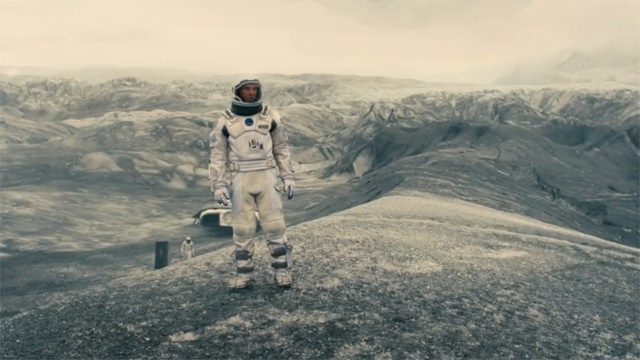Interstellar will thrill your senses but may not touch your heart or mind

‘Interstellar’ deserves to be seen in a big screen, but the ideas behind it aren’t that big.
I like sci-fi movies in theory, by which I mean many of them aren’t very good. But the concepts of science fiction are filled with potential, using ideas about far off technologies and futures that tell stories about how humanity is in the present. These days, we’ve seen a lot of dystopian movies or ones without much in the way of “hope.” And even when you do have that, there’s usually a very strong element of “evil science” in such films.
Of course, anytime you have an “evil empire,” they always have the best tech, like in The Hunger Games or the recent Maze Runner. So the good guys have to take down the system using wit and gumption. Rarely is science seen as what it truly is — objective. Luckily, we have a new movie where science is hero and villain alike, where humanity can doom or save itself by action, not due to evil. From my perspective, it’s about time science had something positive in its portrayal in popular media beyond the propensity for people to use computers as magic.
Interstellar is the latest from acclaimed film director Christopher Nolan and it’s already getting very mixed reviews (mostly positive, but a few very angry outliers). I stand in the camp of liking the movie, but that doesn’t mean it’s the best I’ve seen this month, year, or from Nolan. The movie takes place in the “not too distant future,” where humanity is running out of food so everything else becomes less important. Cooper (played by Matthew McConaughey) is a corn farmer raising two kids, his son Tom who plans to become a farmer after his father, and his daughter Murph (played by Mackenzie Foy of that last Twilight movie) who is more of the scientific nerd/genius type.
But ah, you see, Cooper was actually trained as an engineer and NASA test pilot, but when food became an international priority, he stopped doing what he “was good at.” The first hour or so of the movie does a few things, and is mostly uniformly interesting. After a dust storm, Murph and Cooper find mysterious lines in her room that lead them on a new adventure. Soon enough, they discover a secret NASA program that’s seeking new planets that might support human life. You may be thinking, wait, there aren’t any nearby!
Which is true, the nearest planet that might be habitable is many light years away from Earth. But in the movie, they have discovered a mysterious wormhole near Saturn that is connected to a distant galaxy near several possibly useful planets. So this is the final two intersecting points of the first part of the movie. Setting up the critical relationship between father and daughter, Cooper to Murph and vice versa, showing parallels obvious and subtle, and trying to get the audience to be invested in their future. And this relationship is the trigger to get Cooper to decide to go on the mission (because otherwise there wouldn’t be a movie). Assisted by Cooper’s old professor, Professor Michael Caine (technically it’s “Brand,” but … you know) and the professor’s daughter Amelia (Anne Hathaway) as a fellow astronaut, the team leaves on their mission. But due to science stuff (general relativity, where time moves slower as you move closer to the speed of light), Cooper may not be back for years. Or ever, because space is dangerous.
The second hour of the movie is the adventure in space, action pieces and thrills, with a few snuck in character moments. This is the best part of the movie, the part I was most emotionally connected to and thought was the most exciting. The visuals were superb and wondrous, from the bizarre wormhole to the practical effects of the spaceship. We are also introduced to a few corollary characters, including the wonderfully funny robot TARS (voice of Bill Irwin), but they aren’t as important. Back on Earth, Tom and Murph have grown up into Casey Affleck and Jessica Chastain respectively, and have done what was expected. Tom’s running the farm with a wife and child, while Murph is working with Professor Michael Caine on the secret equation that could move people off the Earth en masse and save humanity. This is when things get a bit … muddled, though, as we finish off in our third hour of the movie (49 minutes, but c’mon!). The final hour of the movie gets a bit weird and the themes a bit simplistic. In terms of enjoyment, the movie started strong, got really strong, and kinda petered out. Was it a terrible ending?
No, it was not a terrible ending, but a bit overly sentimental and obvious. I expected better from the guy behind Memento and Inception, two great movies that expand your mind. This one tries to be clever but it doesn’t quite pull off that cleverness. Although at some points I gripped my seat in suspense and other times I felt affected by the emotions on display, in the end I was more along the lines of “I enjoyed that, but didn’t love it.” But that’s just one piece of it. How about the acting? It’s great! Matthew McConaughey is, of course, great as the self-assured cowboy astronaut farmer engineer pilot rationalist father who cares about his kids and humanity too, if he has time for them. This is not a shlocky performance, but it’s a bit hammy in places. That’s the script though, not him.
Similarly I enjoyed Anne Hathaway as a reasonably interesting character and Michael Caine did his Michael Caine impression to a tee. Mackenzie Foy was excellent as the young Murph, so wipe those worries of Twilight away! Jessica Chastain is great when she gets a chance to be subtle, which is about half the time. The rest of the time, her character gets a bit “exposition” heavy, which is a problem many other characters have as well. I tend to like dialogue and explanations, although I don’t need everything spelled out precisely. This movie is nearly three hours long, and it didn’t need to be as currently written and edited. There are certainly concepts and ideas enough to find in that length of film, but this one felt like it dragged a bit, especially near the end. This won’t be the most memorable space movie of all time, but one thing you can’t deny is that majesty of those visuals.
See this one on a big screen or IMAX, and any quibbles you may have with the story or script will probably just fade away, at least until you leave the theater. But as for me, I liked it well enough that I’m more than okay with seeing it again, and considering the length, that’s saying something. Maybe about me.
 CliqueClack
CliqueClack


